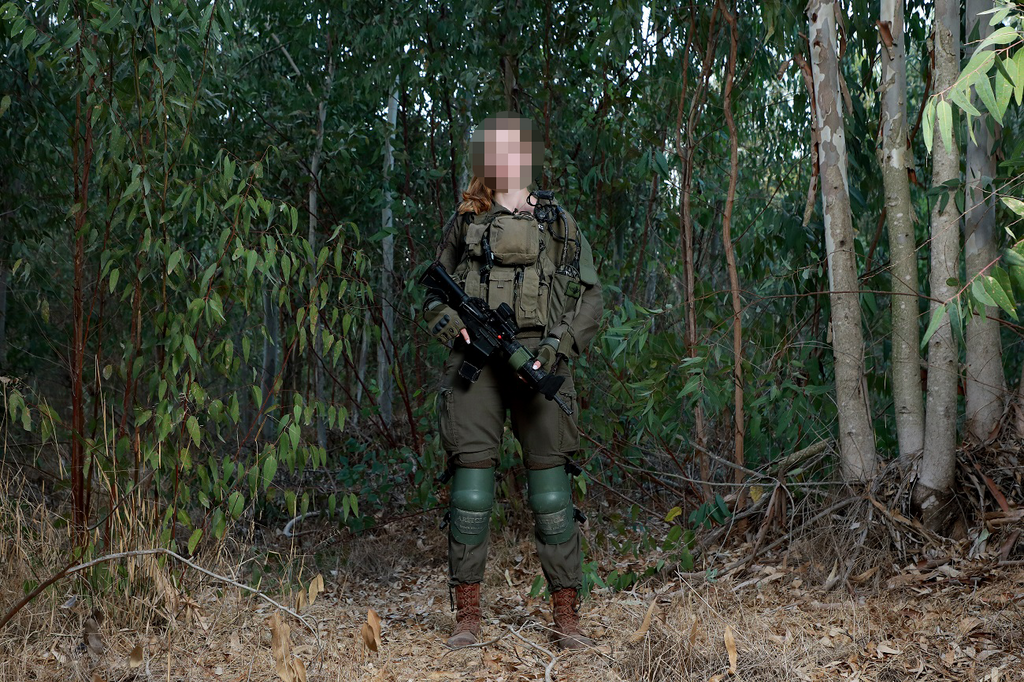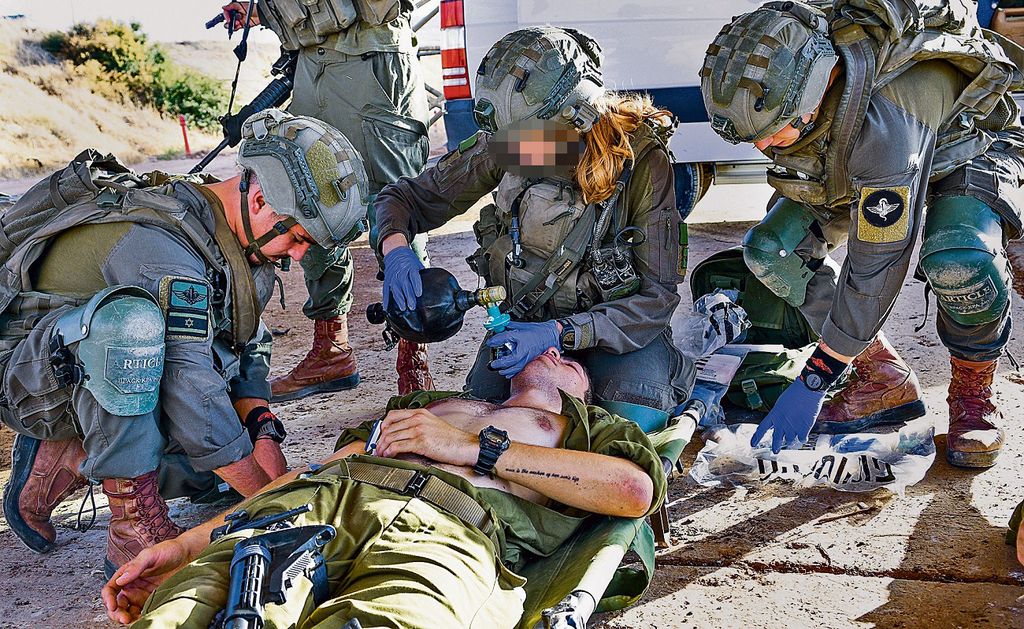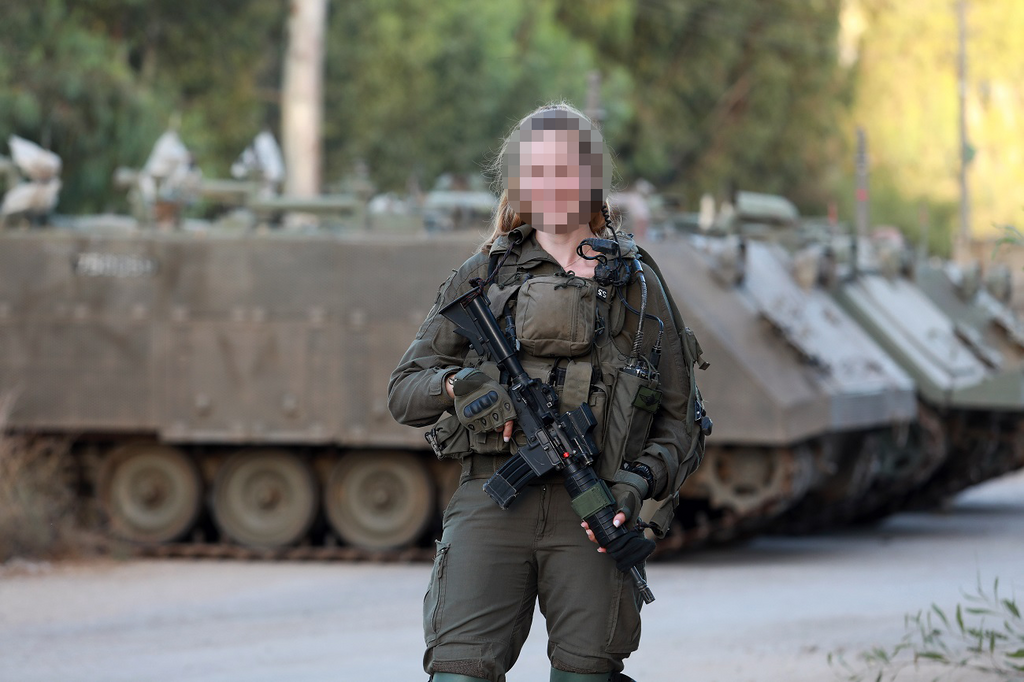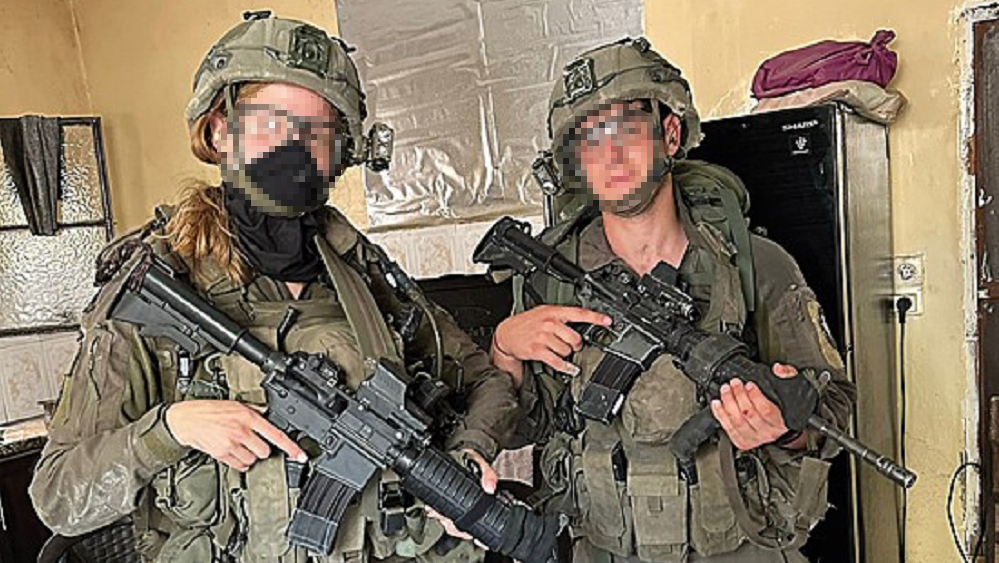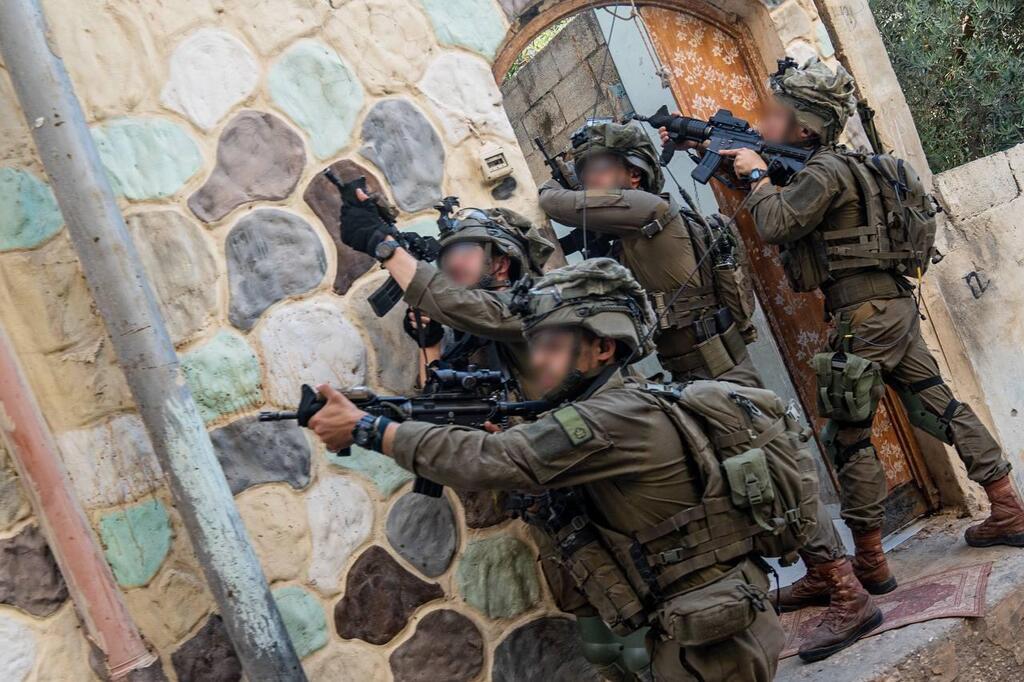During Israel’s large-scale counterterrorist operation in Jenin, dubbed Operation Home and Garden, there was only one moment when she was terrified. Not a slight unease, but real fear. It happened a minute before the vehicles began moving toward the West Bank city.
More stories:
Lieutenant Dr. S., the medic of the Paratrooper reconnaissance unit who went with the fighters into the heart of battle, calmly recalls the moment she found herself murmuring a prayer. "I sat in the ORV (off-road vehicle) with two paramedics, a medical team within the squad, and waited to move. I wore a flak jacket and a helmet. I placed my medic bag on my knees, as you can't hold it on your back while moving.
"At this point, with nightfall, I already knew we were entering Jenin in two waves because there weren't enough armored vehicles to bring in all the fighters, and I knew I'd be in the first wave. Then, suddenly, the ORV door opened."
"Someone shone a flashlight on me to check that I had my dog tag, wrote down my name and who was sitting next to whom, and I thought to myself, 'Wait, this is a record that I'm not too fond of.'
“When they also took my photo, I felt it was an act of 'if something happens to you, there will be something to send home.' I knew it was the necessary procedure before an operation, yet it was truly distressing. The guys were also stressed. We talked about it on the ride. 'We are going to return, we're sure we'll return, so what's with all this drama?'
"Everyone understood the implications of the operation. We were mentally prepared for it. Although I had only assumed my role three weeks before Home and Garden, we established a line near Jenin and entered the city night after night. We knew exactly what was happening in it. We’re not naive."
"As soon as we entered, there were bursts of gunfire and explosives. No one thought they were entering paradise, but once we were inside, I wasn't scared. You're in the middle of the mission, you know what you need to do, what the next step is, and you have to act."
After six years of medical studies as part of a pre-military academic program and a year of internship, Lt. Dr. S. enlisted for a service of four years and eight months. She began her role in May, and by the second week, she already faced her first challenge - a shooting attack with four casualties.
"I was at the post and wasn't even on alert," she recounts, "but the moment I heard gunfire, I grabbed the medical bag and went to the commander's vehicle. In the end, I was the first among the senior caregivers to arrive at the scene. And I was just two weeks into the job, right? It was my first real experience."
Was it as you imagined?
"It's not about imagination, it's about training," she clarifies. "We had victims with shrapnel in the upper body, and shrapnel is a tricky injury. It can appear superficial from the outside, and it's uncertain how deep it has penetrated. Therefore, a victim with shrapnel is classified as seriously injured. Since I wasn't on alert, I had the privilege of joining the ambulance and arriving with them to the triage room at Hillel Yaffe Hospital. Not with a stethoscope and gloves, but with a helmet and weapon. A sort of spectacle."
Did they look at you?
"They always look. Also in Jenin. Especially in Jenin. I enter a house as part of a team arresting terrorists, all of us with black masks on our faces, and suddenly someone spots a hint of blonde hair beneath the helmet. It's an amusing moment."
Amusing?
"Yes, because in the unit, they don't make me feel different or that there's any distinction between me and the fighters. The people sitting in the house we enter in Jenin are surprised by the blonde ponytail and smile at me."
And you?
"I smile back at them. Even in such a situation, it's possible and desirable to be humane. The terrorist doesn't smile at me. That hasn't happened yet."
'I fell in love with surgery'
Indeed, she is blonde ("with touches of ginger"), has green eyes and terra-cotta skin, adorned with a few freckles. And she is tall and slender, 1.79m (5’10). At 26, she was born and raised in Reut, partly due to the fact that her mother’s military career.
Her mother is a former intelligence officer and her father is a lawyer and a former military man. She grew up in a warm home with six children; five of them served or are serving in combat units, and the youngest is waiting to enlist.
S. is the fourth in line - and the only daughter. "Contrary to the classic stories, I'm not the daughter of doctors, and we don't have any doctors in the family," she preemptively answers the question, "But all of my parents' friends are doctors, and there was a lot of engagement and talk about their work. And Grey's Anatomy also had an effect on me, even though there's a world of difference between TV shows and reality.
"I didn't dissect frogs in my biology class because I majored in physics and chemistry - later on, I discovered that in the first year of medical studies there's a lot of physics and chemistry - and I also didn't volunteer with Magen David Adom (Israel's Red Cross), like many of the peers I met in the medical school."
"I fell in love with surgery, but I realized that this field would require me to give up significant parts of real life, family and children, and I ruled out the idea until I felt it was too hard to give up on this passion"
But on the scouts' trip, you bandaged the knee of the guide who stumbled and got scratched.
"No. I never had the opportunity to treat anyone at any point, so when I said I wanted to study medicine, my parents were very surprised. They didn't think that was my direction and they didn't see it coming. It was always clear to me that I would have a significant role in the army; I dreamed of being a pilot. In the invitation to my bat mitzvah, there was a caricature of me inside an airplane. It was my life dream, I admit and confess."
According to her, her parents leaned toward medical studies within the pre-military academic program ("Their friends were also there") and the thought that she would have to give back to the country with an extended service, four years and eight months, did not deter her. "My mother served in the army for 24 years, so 'four-eight' didn't seem intimidating to me. Also, my three older brothers were in the army for many years. It all comes from home."
She went through a double selection process, "both by the Hebrew University and by the army. In my studies, I didn’t faint the first time I dissected a cadaver, but I also didn't really connect with it. In contrast, I felt euphoric the first time I operated on a living person. I helped someone. I fell in love with surgery, but I realized that this field would require me to give up significant parts of real life, family and children, and I ruled out the idea until I felt it was too hard to give up on this passion.
"In my internship, I spent a month in Miami at one of the major trauma centers because I began my studies with trauma medicine in mind. There, I realized that I would do my trauma training in the army, in uniform. Only after my service will I begin my specialization, probably in pediatric surgery."
Her connection with the IDF was maintained throughout her studies. "At the Hebrew University, there's staff in uniform that ensure complementary content of military medicine and command.”
She says that during her studies at the Hebrew University, there was uniformed staff there to ensure that the curriculum complements both military medicine and command training.
90 pounds
"They ask you where you'd like to go, but at the end of the day, it's about compatibility. In the advanced course, aptly called 'baptism by fire', they send you for five weeks to a random battalion to replace the battalion doctor who's out for training, continuing to assess the fit. I was in the Givati Brigade, in Nablus and Shavei Shomron, and I enjoyed it immensely. I came from a background of civilian life and science, and in an instant, I went from zero to a hundred. I was both a doctor and a fighter, a staff officer and also a commander."
And after the baptism by fire, when the assignments began?
"A few reserve battalions opened up. I saw excellent guys competing for the senior medical officer position in the Paratroopers Brigade, and it wasn't a given that I'd get it. Certainly not for me."
Was there a preference for guys?
"Definitely. In the reserve roles, there's a preference for guys. You're expected to be a combatant, to move with a medical bag weighing 50% of your body weight, along with armor, communication equipment and your hydration pack. Ninety pounds in total. It's not suitable for everyone, not even for every male doctor. When you enter into arrest situations, there's never a moment of feeling any difference or matter of gender. It's only about personal ability. That's the metric."
And yet, you're the first female doctor assigned to the Paratroopers Brigade.
"True, but the fact there's never been a woman here before just says they've never taken the risk before. After Home and Garden, I asked the battalion commander if he wasn't worried that I wasn't a combatant and hadn't completed combat training, yet I was placed under his command for such a significant operation. When he admitted he had concerns, I was glad to hear that the unit does not consider my gender.
“I don't feel that every day I have to prove myself as a girl. If anything, it's the opposite; my superiors have never conveyed to me that something is impossible for me because I'm a girl. However, I'm aware of the responsibility on my shoulders. If I fail in my role, they won't place another woman in the brigade. I'd ruin it for all the women who come after me."
You entered Jenin as part of the first team of the first wave.
"Correct," she says with a stoic expression. "We went in to search a building. We did a sweep to ensure everything was secured, that there were no people and no explosives and then began our operation. I can't quote the exact mission specifications, but broadly, the objective was to counterterrorism. Finding weapons and precursors for homemade explosives."
Did you encounter a woman sitting at her doorstep nursing a baby, while a terrorist was hiding inside the house?
"No, even though we entered many homes where families were present, I had a different experience. I was called down to the street to assist a Palestinian woman who was going into labor. I said, 'I'm not going down; it's an unsecured area.' They sent soldiers to secure my position so I could assist the woman giving birth. By the time I got down, an ambulance from the Red Crescent had arrived and taken her away."
And if the ambulance hadn't arrived, would you have helped her give birth?
"Of course. The basic principle of medicine is that you treat anyone in need. During Home and Garden, other units also treated Palestinians who were injured, and some of them were even evacuated to hospitals in Israel. Before we set out on the operation, we expected a high number of casualties. Thankfully, I didn't have to perform surgical procedures in the field, under fire. In my unit, we only had shrapnel injuries, which were treated at the end of the operation."
Why?
"Do you think paratrooper reconnaissance soldiers would report every shrapnel wound? It would take them out of action."
Did you notice signs of combat trauma?
"Yes. I saw them even before the operation, during the shooting attack on soldiers when we were in the Jenin sector. The fighters learned to identify a comrade in distress, and they managed the situation well. They didn't wait for me to arrive and start initial treatment for an acute stress response. Also, in Home and Garden, the fighters identified the classic symptoms of dissociation and did what was needed — mostly to talk, distract and re-engage the fighter in some activity to reconnect him with what was happening around him. The guys managed this on their own, and there are soldiers still receiving treatment."
After Home and Garden, did you get some time off?
"When we got out of Jenin, half the unit had to stay on base for Shabbat," she recounts, "and it wasn't bad. I went through the processing phase with everyone. When we're all together, it's okay. When my parents realized we had returned to the base near home, they came with food for the whole team and treated me as if I had just come back from war."



